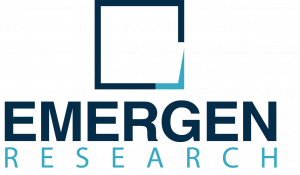Idiopathic Pulmonary Fibrosis Treatment Market Expected to Reach Significant Growth, Driven by Aging Population
Idiopathic pulmonary fibrosis (IPF) treatment market is poised for substantial growth in the coming years
VANCOUVER, BRITISH COLUMBIA, CANADA, June 23, 2024 /EINPresswire.com/ -- The global idiopathic pulmonary fibrosis (IPF) treatment market is poised for substantial growth in the coming years, fueled by a rising prevalence of the disease, an aging population, and advancements in treatment options. According to a report by Emergen Research, the market is expected to reach a value of USD 8.3 billion by 2032, growing at a CAGR of 6.2%.
Claim Your FREE Sample Copy with Table of content@ https://www.emergenresearch.com/request-sample/2800
Market Overview
IPF is a chronic and progressive lung disease characterized by scarring of lung tissue, leading to shortness of breath and a decline in lung function. There is currently no cure for IPF, but treatment options can help manage symptoms and slow disease progression. The IPF treatment market is segmented by drug class, marketed drugs, medication type, route of administration, end-user, and distribution channel.
Key Trends and Drivers
Increasing geriatric population: As the global population ages, the incidence of IPF is expected to rise significantly. This is a major driver for market growth, as older adults are more susceptible to the disease.
Rising awareness and diagnosis rates: Growing public awareness of IPF and advancements in diagnostic techniques are leading to earlier and more frequent diagnoses. This allows for earlier intervention and treatment initiation.
Emerging treatment options: The development of novel therapeutic drugs and antifibrotic medications offers promising avenues for managing IPF and improving patient outcomes. This fuels market expansion.
Restraints and Challenges
High cost of treatment: Existing IPF medications are often expensive, limiting access for some patients and placing a burden on healthcare systems.
Limited treatment efficacy: Current therapies can only slow disease progression and manage symptoms, not reverse lung damage. This highlights a need for more effective treatments.
Lack of early detection methods: The absence of specific early-stage IPF biomarkers makes early detection challenging, hindering timely intervention.
Growth Opportunities
Focus on combination therapies: Research into combining existing drugs or developing new drug combinations to achieve better therapeutic outcomes presents a significant growth opportunity.
Precision medicine advancements: The development of personalized medicine approaches tailored to individual patient needs and disease characteristics holds promise for improved treatment effectiveness.
Increased government funding: Growing government support for IPF research and development initiatives can accelerate the discovery of new and effective treatments.
Market Insights
Nintedanib and pirfenidone are currently the leading drugs used in IPF treatment, but the "others" segment, encompassing emerging therapies, is expected to witness the highest growth rate due to the influx of novel treatment options.
North America is expected to hold the largest market share due to a high prevalence of IPF, well-developed healthcare infrastructure, and early adoption of new technologies. However, the Asia Pacific region is anticipated to demonstrate the fastest growth rate due to a rapidly aging population and increasing healthcare spending.
We Have Recent Updates in Sample Copy: https://www.emergenresearch.com/request-sample/2800
SWOT Analysis
Strengths:
Growing unmet medical need for effective IPF treatments
Active research and development pipeline for novel therapies
Rising public awareness of the disease
Weaknesses:
High cost of current treatment options
Limited efficacy of existing medications
Lack of specific biomarkers for early IPF detection
Opportunities:
Development of combination therapies and personalized medicine approaches
Growing government and private sector funding for IPF research
Increasing adoption of advanced diagnostic techniques
Threats:
Stringent regulatory processes for drug approval
Potential for patent expirations of current leading drugs
Reimbursement challenges for new and expensive therapies
Latest Strategic Developments
On 24 October 2023, Bristol Myers Squibb announced the approval of Therapy Designation from U.S. FDA for Investigational LPA1 Antagonist in treating progressive pulmonary fibrosis. LPA1 activation play a crucial role in the development of pulmonary fibrosis. Preclinical in vitro and in vivo studies have shown that LPA1 antagonism may offer promising therapeutic benefits for treating lung injury and fibrosis. This designation expedites development and regulatory review process, potentially bringing this innovative treatment to patients faster.
On 9 August 2023, Pliant Therapeutics announced commencement of BEACON-IPF, a Phase 2b clinical trial assessing the efficacy and safety of bexotegrast, an oral, small molecule inhibitor of integrins αvβ6 and αvβ1, in the treatment of IPF. This trial builds upon encouraging results from the Phase 2a INTEGRIS-IPF trial, which demonstrated bexotegrast's potential efficacy and safety in IPF patients. This initiation of BEACON-IPF represents a significant advancement in the development of bexotegrast as a potential treatment for IPF, a progressive and life-threatening lung disease with limited treatment options.
IDF Treatment Top Companies and Competitive Landscape
The global IPF treatment market is fairly fragmented, with many large and medium-sized players accounting for the majority of market revenue. Major players are deploying various strategies, entering into mergers & acquisitions, strategic agreements & contracts, developing, testing, and introducing a more effective Idiopathic Pulmonary Fibrosis (IDF) treatment market.
Some major players included in the global IDF treatment market report are:
AstraZeneca
Biogen
Boehringer Ingelheim International GmbH
Hoffmann-La Roche Ltd.
FibroGen, Inc.
Mission Therapeutics
GNI Group Ltd.
Bristol Myers Squibb Company
Cipla Inc.
Amgen Inc.
IDF Treatment Market Segment Analysis
For the purpose of this report, Emergen Research has segmented the global Idiopathic Pulmonary Fibrosis (IDF) treatment market on the basis of drug class, drug type, end-use, and region:
Drug Class Outlook (Revenue, USD Billion; 2019-2032)
MAPK inhibitor
Esbriet
Tyrosine Kinase
Ofev
Autotaxin Inhibitors
GLPG 1690
Drug Type Outlook (Revenue, USD Billion; 2019-2032)
Pirfenidone
Nintedanib
End-Use Outlook (Revenue, USD Billion; 2019-2032)
Hospital
Clinics
Pharmacies
Ask For Customization: https://www.emergenresearch.com/request-for-customization/2800
Country scope: U.S., Canada, Mexico, Germany, U.K., France, Spain, BENELUX, Rest of Europe, China, India, Japan, South Korea, Rest of APAC, Brazil, Rest of LATAM, Saudi Arabia, UAE, Israel, and Rest of MEA
Eric Lee
Emergen Research
+91 90210 91709
sales@emergenresearch.com
Visit us on social media:
Facebook
X
LinkedIn

